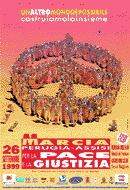
March for peace Perugia Assisi 1999
Interview with
Vadimir Zagladin
(vice-president of Gorbacev foundation)
Back to index
This is the first time that you have taken part in the Assembly of the UN of the Peoples: have you already got an idea of what this event is like?
I could tell you many things... Some days ago, I participated in the Trento Forum about human rights for all (1) , which was very interesting in its contents. On the one hand there were experts in human rights, mostly Italian, and on the other you had the representatives of international organisations that actually act for human rights. For example, there was an Ecuadorian missionary priest who has done so much work with his group, without speaking much. I said this many times and I repeated it here in Perugia: we shouldnít only speak, but act. And heís one who really takes action. Then I had a meeting at the Law Faculty of Trento, a very interesting one, where many new ideas emerged. I was deeply touched by the atmosphere that I experienced in Trento, by the town itself as well as by the people that I met.
Could you tell us something about your impressions on the first sessions of the Assembly in Perugia?
Todayís talks seemed to me to be very interesting and productive. Professor Falk, despite his being from the US, spoke like a real European. You have many intellectuals in the United States who are intelligent, well learned and progressive, but many of them are not, and his speech was representative of the best part of the American intellectual world. I also liked the speech of Luciano Violante, whom Iíve known for years: he was brief, concise, but effective.
You just said that practical actions are outnumbered by words. Do you have the impression that here, in Perugia, there is much chitchat and few practical facts?
I think that the problem doesnít lie in how much you speak, but in the fact that people tend to do much less than they say. Anyway, this fact was underlined both in Trento and in Perugia. Itís okay to speak, but we need to do more than that.
Regarding what people speak about, there is much talk about the need to make the UN more democratic. Could you tell us your opinion about that?
Firstly, the UN is an organisation of states, and states always follow the rule according to which the stronger one wins. Of course you can change some things, and some states are ready to do something to make it more democratic, but not all of them. Indeed, superpowers donít share this view. We should think of democratising the UN as it exists now, but we should look at other ways. For instance, Mr Violante talked about the Members of Parliament, and the MPs represent the people. We may think about a "Chamber of the Parliaments", which would exert a democratic influence on the UN.
And why not think about some sort of a "Council of the Sage", consisting of the representatives of the NGOs, and therefore by the global civil society, with an advisory and propositional role? This is only an idea, but there can be many other ideas. One thing is clear, anyway: itís imperative to find methods to democratise the UN. The Perugia Assembly Manifesto says that we already know everything, that everything is already known and that in the light of this, peace is possible. I donít think that this is the case: we donít know everything yet, and the tools that we have are simply not sufficient. We still have to be forward-looking and far-reaching.
(1) Editorís note: one of the forums organised in preparation to the March